
After months of mutual animosity, President Donald Trump and New York City Mayor-elect Zohran Mamdani met for the first time in a widely anticipated meeting late last week. But after the two discussed Mamdani’s plans to lower the cost of living in New York City, where both men grew up, Trump said that he and Mamdani “agree on a lot more than I would have thought” and promised to work together once Mamdani takes office in January. The newly friendly relationship is likely temporary, but still “remarkable,” says Ross Barkan, who is writing a book about Mamdani’s rapid political rise. “If Trump is less antagonistic towards Mamdani, the idea is to have Trump do as little damage as possible to New York City,” Barkan says of Mamdani’s conciliatory approach to the meeting. “He’s not going to attack. He’s going to try to build coalitions.”
Barkan also comments on the brewing intra-party conflict between the Democratic establishment and the more left-wing Democratic Socialists of America — whose members, including Mamdani, typically run for elected office as Democrats — as well as what Trump’s lack of challenge to Mamdani’s assertion that Israel is committing a genocide in Gaza says about the shifting discourse on Israel-Palestine in the United States.
Transcript
AMY GOODMAN: This is Democracy Now!, democracynow.org, The War and Peace Report. I’m Amy Goodman.
President Trump and New York mayor-elect, the democratic socialist Zohran Mamdani met Friday at the White House in the Oval Office for the first time. Over the past several months, both Trump and Mamdani have harshly criticized each other. Trump has called Mamdani a “communist lunatic” and a, quote, “Jew hater.” Trump had also threatened to send the National Guard to New York and cut off billions of dollars in federal funding to New York City if Mamdani was elected. Meanwhile, Mamdani has described Trump as a “fascist” and a “despot.”
Many of Trump’s supporters had criticized Trump for inviting Mamdani, who will soon become New York’s first Muslim and South Asian mayor. The far-right conspiracy theorist Laura Loomer said it was, quote, “Wild to allow a jihadist communist to stand behind the President’s desk in the Oval Office,” unnquote.
But President Trump struck a very different tone as he openly embraced Mamdani’s effort to make New York City more affordable. These are excerpts from their press conference in the Oval Office.
PRESIDENT DONALD TRUMP: We’ve just had a great meeting, a really good, very productive meeting. We have one thing in common: We want this city of ours, that we love, to do very well.
And I wanted to congratulate the mayor. He really ran an incredible race against, you know, a lot of smart people, starting with the early primaries against some very tough people, very smart people, and he beat them, and he beat them easily. And I congratulated him.
And we talked about some things in very strong common, like housing and getting housing built, and food and prices. And the price of oil is coming way down. Anything I do is going to be good for New York. If I can get prices down, it’s good for New York. And we’ve got them down, way down from — from last year. We have — as you know, I’ve been saying to a lot of people, Walmart said that Thanksgiving this year is exactly 25% less than last year. So that’s good for New York, good for everybody.
But I just want to congratulate — I think you’re going to have, hopefully, a really great mayor. The better he does, the happier I am, I will say. There’s no difference in party. There’s no difference in anything. And we’re going to be helping him to make everybody’s dream come true, having a strong and very safe New York. And congratulations, Mr. Mayor.
MAYOR-ELECT ZOHRAN MAMDANI: Thank you, Mr. President.
PRESIDENT DONALD TRUMP: Thank you.
MAYOR-ELECT ZOHRAN MAMDANI: I appreciate it.
PRESIDENT DONALD TRUMP: Please.
MAYOR-ELECT ZOHRAN MAMDANI: I appreciated the meeting with the president. And as he said, it was a productive meeting focused on a place of shared admiration and love, which is New York City, and the need to deliver affordability to New Yorkers, the eight-and-a-half million people who call our city their home, who are struggling to afford life in the most expensive city in the United States of America.
We spoke about rent. We spoke about groceries. We spoke about utilities. We spoke about the different ways in which people are being pushed out. And I appreciated the time with the president. I appreciated the conversation. I look forward to working together to deliver that affordability for New Yorkers.
STEVEN NELSON: Mr. Mamdani, it sounds like you had a productive discussion. But just days ago, you referred to President Trump as a “despot” who had “betrayed the country.” You said you’d be his “worst nightmare,” and accused him of having a “fascist agenda.” Are you planning to retract any of these remarks in order to improve your relationship?
MAYOR-ELECT ZOHRAN MAMDANI: I think both President Trump and I, we are very clear about our positions and our views. And what I really appreciate about the president is that the meeting that we had focused not on places of disagreement — which there are many — and also focused on the shared purpose that we have in serving New Yorkers. And frankly, that is something that could transform the lives of eight-and-a-half million people who are currently struggling under a cost of living crisis, with one in four living in poverty. And the meeting came back again and again to what it could look like to lift those New Yorkers out of struggle and start to deliver them a city that they could do more than just struggle to afford it, but actually start to live in it.
PRESIDENT DONALD TRUMP: And I’ve been called much worse than a despot, so it’s not — it’s not that insulting. Maybe — I think he’ll change his mind after we get to working together. …
REPORTER 1: You’ve threatened to send federal troops to New York City. You both have differences when it comes to ICE agents —
PRESIDENT DONALD TRUMP: Right.
REPORTER 1: — in New York City. Mr. Mamdani, you’ve called ICE a rogue government entity. I wonder how you reconcile your differences on both of those issues.
PRESIDENT DONALD TRUMP: Well, I think we’re going to work them out. And I think that if we have known murderers and known drug dealers and some very bad people, you know, we want to get them out. And the mayor wants to have peace. We’ve discussed this at great length, actually, maybe more than anything else. He wants to have a safe New York. Ultimately, a safe New York is going to be a great New York.
JACQUI HEINRICH: I want to ask the mayor-elect about a House resolution, just passed overwhelmingly, to condemn socialism, including with 86 Democrats, all of House Dem leadership and the Minority Leader Hakeem Jeffries, despite his endorsement of you. What’s your reaction to that?
MAYOR-ELECT ZOHRAN MAMDANI: I have to be honest with you: I focused very little on resolutions. Frankly, I’ve been focusing —
JACQUI HEINRICH: They condemned socialism.
MAYOR-ELECT ZOHRAN MAMDANI: I understand. I think the focus is on the work at hand. I can tell you I am someone who is a democratic socialist. I’ve been very open about that. And I know there might be differences about ideology, but the place of agreement is the work that needs to be done to make New York City affordable. That’s what I look forward to.
JACQUI HEINRICH: And I want to clarify your answer to Steven Nelson. He asked about your comment calling the president a fascist. And your answer was “both President Trump and I have been clear about our positions and our views.”
MAYOR-ELECT ZOHRAN MAMDANI: Mm-hmm.
JACQUI HEINRICH: Are you affirming that you think President Trump is a fascist?
MAYOR-ELECT ZOHRAN MAMDANI: I’ve spoken about the —
PRESIDENT DONALD TRUMP: That’s OK. You can just say yes. So —
MAYOR-ELECT ZOHRAN MAMDANI: OK. All right.
PRESIDENT DONALD TRUMP: OK?
MAYOR-ELECT ZOHRAN MAMDANI: Yeah.
PRESIDENT DONALD TRUMP: It’s easier.
MAYOR-ELECT ZOHRAN MAMDANI: Yeah.
PRESIDENT DONALD TRUMP: It’s easier than explaining it. I don’t mind.
AMY GOODMAN: Excerpts of President Trump and New York Mayor-elect Zohran Mamdani at the White House Friday.
On Sunday, Mayor-elect Mamdani appeared on Meet the Press. He was interviewed by Kristen Welker.
KRISTEN WELKER: Mr. Mayor-elect, just to be very clear: Do you think that President Trump is a fascist?
MAYOR-ELECT ZOHRAN MAMDANI: And after President Trump said that, I said, “Yes.’ And —
KRISTEN WELKER: So you do?
MAYOR-ELECT ZOHRAN MAMDANI: And that’s something that I’ve said in the past. I say it today. And I think what I appreciated about the conversation that I had with the president was that we were not shy about the places of disagreement, about the politics that has brought us to this moment, and we also wanted to focus on what it could look like to deliver on a shared analysis of an affordability crisis for New Yorkers.
KRISTEN WELKER: You’ve also said in the past that President Trump has engaged in a, quote, “attack on our democracy.” You’ve called him a “despot.” Do you still believe President Trump is a threat to the democracy?
MAYOR-ELECT ZOHRAN MAMDANI: Everything that I’ve said in the past, I continue to believe. And that’s the thing that I think is important in our politics, is that we don’t shy away from where we have disagreements, but we understand what it is that brings us to that table, because I’m not coming into the Oval Office to make a point or make a stand. I’m coming in there to deliver for New Yorkers. And a few weeks ago, I was asked by a reporter three words to describe myself. I said, “New York City.” And that’s what animated that conversation. How do we deliver for the people of New York City?
AMY GOODMAN: We’re joined right now by Ross Barkan, journalist, author, columnist for the New York magazine. His latest book is Fascism or Genocide: How a Decade of Political Disorder Broke American Politics. His most recent piece for New York magazine is titled “Zohran Mamdani Is a Mayor for a New Age in [New York City].” He’s now writing a book for Random House on Mamdani’s rise. In 2018, Ross Barkan ran for New York state Senate. Zohran Mamdani served as his campaign manager.
Ross Barkan, welcome back to Democracy Now! You know Zohran Mamdani very well. Talk about the significance of this meeting at the White House on Friday.
ROSS BARKAN: Well, it was obviously a remarkable meeting. You, going in, don’t expect them to be so chummy, and then the tableau was certainly jarring. But I would say there were reasons that they were able to get along. I do think Trump respects Mamdani because he’s been successful, because he’s built a movement behind him, because he’s charismatic, because he subverted his political establishment. Trump did the same thing on the Republican side. So, I do think Trump has less respect for establishment Democrats like Chuck Schumer and Hakeem Jeffries. He looks to Mamdani. He sees someone who is new. He’s a fresh face.
They’re certainly going to battle. There’s no doubt they cannot be friends forever. But it was notable, and it does help New York City if Trump is less antagonistic towards Mamdani. The idea is to have Trump do as little damage as possible to New York City. That was the goal of the meeting. So, so far, for Mamdani, so good. We’ll see what happens next.
AMY GOODMAN: I mean, it’s very interesting. I want to go back to President Trump’s meeting with Mamdani.
MAYOR-ELECT ZOHRAN MAMDANI: We discussed ICE and New York City, and I spoke about how the laws that we have in New York City allow for New York City government to speak to the federal administration for about 170 serious crimes, the concerns that many New Yorkers have around the enforcement of immigration laws on New Yorkers across the five boroughs, and most recently, we’re talking about a mother and her two children, how this has very little to do with what that is.
PRESIDENT DONALD TRUMP: What we did is we discussed crime. More than ICE, per se, we discussed crime. And he doesn’t want to see crime, and I don’t want to see crime. And I have very little doubt that we’re not going to get along on that issue. He wants to — and he said some things that were very interesting, very interesting as to housing construction. And he wants to see houses go up. He wants to see a lot of houses created, a lot of apartments built, etc. And, you know, I — we actually — people would be shocked, but I want to see the same thing.
AMY GOODMAN: So, let’s unpack this, from the threat of sending ICE agents and federal troops into New York, whether you think this is going to happen, to the issue of housing and affordability, and whether or not they see the same thing, President Trump saying he could see living in the New York City of Mayor Mamdani.
ROSS BARKAN: Well, I’ve long thought that Trump was going to send the National Guard into New York City under a Mamdani administration. One thing about this meeting is that could have changed that seemingly inevitable future. We’ll find out. I mean, Trump is extremely mercurial, so one can’t really know. But if Mamdani can successfully keep the National Guard out of New York City, that’s certainly a victory for him.
As for the ICE incursions. I mean, that’s going to be fascinating, because the real vicious use of ICE has been a hallmark of Trump’s second term under Tom Homan. So, I still find it hard to believe ICE will simply retreat out of New York City. But if Mamdani has a dialogue with Trump, perhaps New York can avoid the fate of a Chicago, where ICE has really been wreaking havoc, day in and day out, and other cities, as well. And if they continue to have this dialogue, if they continue to have a relationship, perhaps ICE is less determined to wantonly arrest people. I still don’t know if Mamdani will be able to keep Trump at bay in that way. It’s just hard to know. But certainly the meeting was productive.
Then, in terms of housing, it’s very interesting. I mean, Trump is a developer at heart, so he understands the language of building, that you have to build more housing. I don’t know if that means the federal government will be helpful in any way. I don’t really expect it. But it showed there was some commonality there.
AMY GOODMAN: So, let me ask you about what happened right before their meeting at the White House. You had Congress voting on a bipartisan resolution, with scores of Democrats joining, condemning the, quote, “horrors of socialism.” It had been introduced, this resolution, about a month ago, but the Republicans decided to bring it on the floor Friday morning. The response that Zohran Mamdani had to this is that he’s a democratic socialist. Talk about the meaning of this and the scores of Democrats, including the House minority leader, the House Minority Leader Hakeem Jeffries, who represents Brooklyn, who just recently endorsed Zohran Mamdani, joining in the condemnation.
ROSS BARKAN: Well, Mamdani has been incredibly accommodating to Hakeem Jeffries, who might end up the House speaker in 2027, even though Jeffries offered only a tepid endorsement and has not been terribly helpful to him, to be frank. But I think Mamdani wants to build a broad coalition. He wants the help of the governor to implement his agenda. Kathy Hochul and Hakeem Jeffries are close, so I think it’s important to maintain those ties for him to deliver on his agenda.
I mean, the reality is that the Republicans, who really wanted to upset or discombobulate Mandani, failed. They also failed to move Trump fully into their column. You know, Trump flattered Mamdani and had praise for him and, in a way, created complications for their 2026 midterm strategy, which is to tie all Democrats to Mamdani.
So, on one hand, you have a lot of centrist Democrats who are never going to understand Mamdani’s appeal, or don’t want to, and they’re going to run away from the term “socialism.” As we saw with Mamdani, at least in New York City, one can run towards the term and win. So, he’s an accomodating person. He’s not going to attack; he’s going to try to build coalitions. That’s what he’s doing right now. But we shall see what the future holds.
AMY GOODMAN: Ross Barkan, what do you make of NYC-DSA — that’s the Democratic Socialists of America — just voting not to endorse City Councilmember Chi Ossé’s challenge against New York Congressmember Hakeem Jeffries, with more than half, 52%, of DSA members rejecting him?
ROSS BARKAN: Well, the reality is, from a practical standpoint, Mamdani didn’t want that primary, because it was going to be quite bloody. It was probably — is probably not winnable. It’s going to be inordinately difficult, because Jeffries is not like Joe Crowley. He’s not like Andrew Cuomo. He has no scandals. He doesn’t hide from his district.
Also, Chi Ossé himself is not really a member of DSA. He joined very recently. So, there was excitement around him, and there’s a lot of rank and file who want to take on Hakeem Jeffries, who’s very pro-Israel and who’s a centrist, but the reality is, Ossé was probably not the ideal vessel for DSA. DSA really wants candidates who are loyal to the organization, who are going to work closely with the organization, like Mamdani. I think there is distrust towards Ossé.
And also, Ossé didn’t quite make the case that he could defeat Hakeem Jeffries. If you’re going to undertake a primary like that, that’s going to be incredibly divisive, and maybe worthy, but also very tough, you’ve got to show you can win. I don’t think enough members of DSA nor Mamdani were won over.
AMY GOODMAN: During the White House press conference, Zohran Mamdani was asked about Israel and Gaza.
REPORTER 2: You accused the U.S. government of committing genocide in Gaza while President Trump was working on peace. Why? Why that?
MAYOR-ELECT ZOHRAN MAMDANI: I’ve spoken about the Israeli government committing genocide, and I’ve spoken about our government funding it. And I shared with the president in our meeting about the concern that many New Yorkers have of wanting their tax dollars to go towards the benefit of New Yorkers and their ability to afford basic dignity. And what we see right now is we’re in the ninth consecutive year of more than 100,000 schoolchildren being homeless in our city, and there’s a desperate need not only for the following of human rights, but also the following through on the promises we’ve made New Yorkers. And I appreciated the meeting we had and the work that we can do.
AMY GOODMAN: Mayor-elect Zohran Mamdani. Ross Barkan, you’re the author of the book Fascism or Genocide: How a Decade of Political Disorder Broke American Politics. The significance of the mayor-elect talking about Israel’s assault on Gaza as a genocide and standing by what he has been saying now for several years?
ROSS BARKAN: It’s actually quite remarkable, and I thought it got overshadowed in that meeting. The headlines are all about how well the two men got along and how much Trump liked Mamdani. But the fact that Zohran Mamdani went and stood inside the White House and called what Israel did to Gaza a genocide is — it would have been unthinkable even a year ago. When you think of how much the paradigm has shifted around Israel and Gaza and Palestine, I mean, this is something that, you know, for Israel hawks, should be particularly concerning, and, for the pro-Palestine left, should be exciting. I mean, this is really a moment I do think we’ll look back on as a time when politics truly shifted in this country, because Mamdani did not back down.
And also, Trump did not criticize him for saying that. And that’s the other part of this that really jumped out to me. Trump did not rush to defend Netanyahu. And Trump is obviously very much an Israel hawk and very much a defender and enabler of the Netanyahu regime. But the fact that even he himself is willing to permit that kind of criticism, and the fact that he himself is even weary of the Netanyahu war to some degree, I mean, shows that there has been a true shift on the ground.
AMY GOODMAN: Ross Barkan, I want to thank you for being with us, jurnalist, author, columnist for New York magazine, now writing a book on Zohran Mamdani.
Tune in on Friday for a Democracy Now! special on the rise of Zohran Mamdani. Coming up, the U.N. climate summit, COP30, has ended in Belém, Brazil. A deal was reached, but it makes no mention of phasing out fossil fuels. Stay with us.
[break]
AMY GOODMAN: “What’s Buggin’ You Baby” by the late folk legend Michael Hurley, performing in our Democracy Now! studio. To see his performance, as well as our interview, go to democracynow.org.

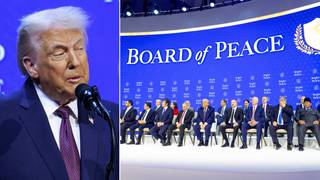
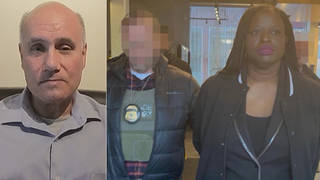
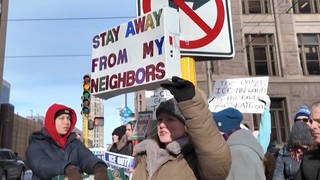
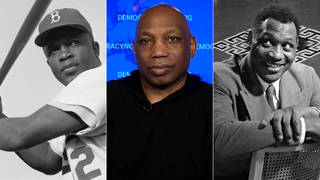





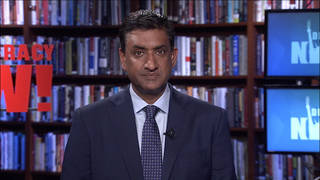
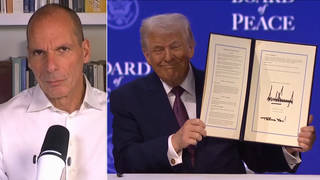
Media Options